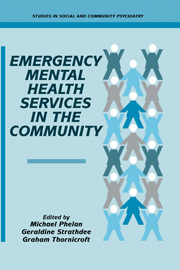Book contents
- Frontmatter
- Contents
- Contributors
- Foreword
- PRINCIPLES AND POLICIES
- 1 The scope and limitations of emergency mental health services in the community
- 2 Service models in emergency psychiatry: an international review
- 3 Users' perspective on emergency needs
- 4 Legal aspects of mental health emergencise
- 5 The economics of mental health emergency services
- 6 Suicide prevention
- 7 Using the crisis
- 8 Community assessment of crisis
- CHALLENGE OF IMPLEMENTATION
- Index
3 - Users' perspective on emergency needs
from PRINCIPLES AND POLICIES
Published online by Cambridge University Press: 28 October 2009
- Frontmatter
- Contents
- Contributors
- Foreword
- PRINCIPLES AND POLICIES
- 1 The scope and limitations of emergency mental health services in the community
- 2 Service models in emergency psychiatry: an international review
- 3 Users' perspective on emergency needs
- 4 Legal aspects of mental health emergencise
- 5 The economics of mental health emergency services
- 6 Suicide prevention
- 7 Using the crisis
- 8 Community assessment of crisis
- CHALLENGE OF IMPLEMENTATION
- Index
Summary
A growing call for crisis services
In this chapter we will attempt to give a representative picture of the views of mental health service users, on current acute mental health services and outline suggestions for improvement. As we are all based in Britain, our account will inevitably focus on the current British situation, but it is our belief that this mirrors the situation in many other countries Wherever user groups have emerged, they have consistently and independently come up with the demand for a better response to people experiencing a mental health crisis. There are a number of common complaints. Sometimes the system offers next to nothing:
I have padded through the streets at 2 a.m. before now, seeking help from the nearest police station. It would have been nice to think I could have rung up a caring person in a crisis house.
(User contacting MIND.)Sometimes it offers admission to the acute unit of a district general hospital, which may be experienced as bewildering or unhelpful:
I was taken to a psychiatric unit which is part of a large general hospital. My clothes and personal belongings were taken away from me. I had no idea why I needed to be placed somewhere where contact with my family and friends disappeared so suddenly when I needed it most.
(Beeforth et al., 1990.)Sometimes it involves the use of legal powers or other forms of control.
- Type
- Chapter
- Information
- Emergency Mental Health Services in the Community , pp. 39 - 60Publisher: Cambridge University PressPrint publication year: 1995
- 2
- Cited by

